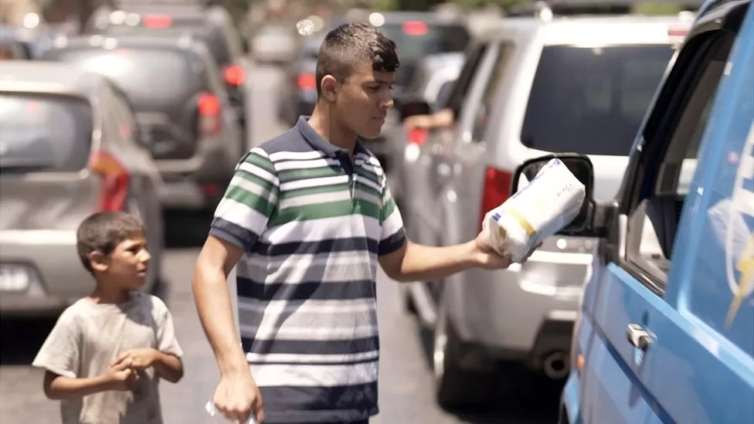The future of millions of children is at risk as growing numbers are pulled out of school and into work, the head of the United Nations' labour body has told the BBC.
Gilbert Houngbo, director-general of the International Labour Organization (ILO), said there had been a "regression" in regions around the world amid global economic problems.
Some of the worst forms of work involved sexual exploitation.
He said urgent action was needed.
"Compound the Covid effect with the rise in inflation and the cost of living that followed [and] it has just made things worse," he said. "Unless we act now and we act decisively and fast, the problem will [continue to] worsen."
Data compiled by the UN in early 2020 found that some 160 million children were being subjected to child labour and that global progress to end it had stalled for the first time in 20 years. Mr Houngbo, the former prime minister of Togo, said early data suggested the trend was continuing.
He said a squeeze on living costs - driven in part by rising food and energy prices caused by the war in Ukraine - had for some families "made the difference between having one meal a day or not".
In some cases, this had led to the "worst form of child labour", where parents were pushing their children into sex work to help support their families.
In the coastal city of Mombasa in south-eastern Kenya, one 14-year-old girl told the BBC she had no choice but to look for work as her mother struggled to afford food and school fees for her and her two siblings.
To make money, she said she had been "sleeping with men, washing clothes and plaiting hair".
When she does attend school, she said she sometimes feels so hungry that she "can't get the pen to write".
Speaking from their small home, her mother said it was "not easy to tell a child to do something like that".
But she said she was unable to support her family after losing her job during the pandemic and now struggled to make ends meet washing clothes.
"It is very heartbreaking. I would like my child to go to school like other children so that she can get a good job that will help her in the future, but because I don't have any means she is forced to do that job."
A woman running a nearby brothel said her business was "thriving" as she was getting more and more young girls desperate for money.
Mr Houngbo said the rise in child labour was being seen in low- middle- and high-income countries, and in sectors including agriculture, mining and construction.
"Clearly we are in a critical moment," he said, adding that "poverty is the root cause".
The exact circumstances in different countries vary, but the UN children's fund (Unicef) says inflation and the rising cost of living are a "universal concern" that impacts children in a range of ways.
"Many families out of desperation need to resort to really impossible choices and negative coping strategies that are affecting children now and in the long-term," said Natalia Winder-Rossi, director of Unicef's social policy and social protection programme.
The BBC has visited several countries to see how economic problems are affecting children.
In the southern Lebanese city of Sidon, children said they had dropped out of school to support their families.
"When I was at school I used to dream of becoming a teacher. [Now] I stopped dreaming," 14-year-old Alaa, who works cleaning people's houses, told the BBC.
Unicef says more than one in 10 families in Lebanon send their children to work. The country is facing an almost total collapse of its economy.
"I would like to go to school of course, but in this situation who would think of going to school? You need to provide for your family. I'm suffocating... but I have to put up with it," said 15-year-old Muhammad, who sells tissues in the road to passing cars.
But Mr Houngbo said that while the situation was "very worrisome", he remained optimistic that solutions could be found.
He said there was no "one size fits all approach", but policies focusing on education, creating jobs, and cracking down on illicit industries were among the actions that could be taken.
Governments needed to "step up now", he said.
Latest Stories
-
I’ll stay out of the politics and theatrics – Wontumi’s lawyer
6 minutes -
Augusco beats Mfantsipim to clinch Central Region Table Tennis trophy
50 minutes -
Liverpool sign Jeremie Frimpong from Leverkusen for £29.5m
1 hour -
Parliament approves GHS10 billion for National Health Insurance Authority
3 hours -
Mentally challenged person beheads man in Tema
3 hours -
Ghana Digital Centres Limited hosts successful Tech Startup workshop
3 hours -
Ghanaian Policeman secures podium finish at global INTERPOL cyber warfare simulation
3 hours -
Breakthrough cancer drug doubles survival in trial
3 hours -
Government to sanction telcos over poor services
4 hours -
From thirst to triumph: VIMA delivers safe water to forgotten village in Ghana
5 hours -
37 Military Hospital shuts down Emergency Unit for fumigation from June 4
5 hours -
Overhaul or scrap Council of State – CDD-Ghana Research
7 hours -
Abdul-Rasheed Saminu sets new National Record in the men’s 100m, books qualification for Tokyo World Championships
7 hours -
Supreme Court allows Trump to revoke legal status for 500,000 migrants
7 hours -
Eugene Boadi: Bryan Acheampong’s impact on entertainment sector
8 hours

